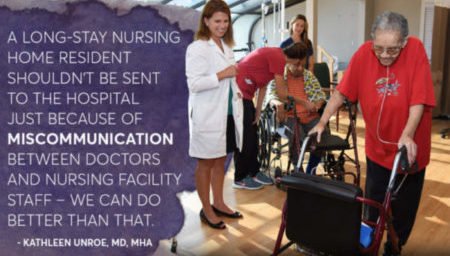Regenstrief Institute and Indiana University Center for Aging Research investigators are testing whether providing nursing homes and the doctors and nurse practitioners who care for their residents with increased Medicare payments can further reduce avoidable hospitalizations.
This ongoing second phase of OPTIMISTIC, an innovative model of care management for long-stay nursing home residents, saw a significant 33 percent improvement in its initial phase, which did not include a financial incentive. The care of long-stay nursing home residents can be fragmented by hospitalizations, which are especially burdensome to older adults as well as costly to the healthcare system.
“Improving Nursing Facility Care through an Innovative Payment Demonstration Project: OPTIMISTIC Phase Two” is published in the Journal of the American Geriatrics Society. The 40 nursing homes participating in the OPTIMISTIC Phase Two care model are reimbursed for onsite treatment of the six most common conditions of older nursing home residents linked to unnecessary hospitalizations — pneumonia, urinary tract infections, congestive heart failure, dehydration, skin ulcers, and chronic obstructive pulmonary disease. The goal is to provide long-stay residents with more comprehensive quality care where they live and avoid disruptive and expensive hospitalizations.
“This paper is about getting a large, important project with multiple partners, including nursing homes across the state of Indiana, off the ground,” said project director for OPTIMISTIC Phase 2, Kathleen Unroe, M.D., M.H.A., a Regenstrief Institute and IU Center for Aging Research investigator and an IU School of Medicine associate professor of medicine. “Under the current CMS [Centers for Medicare and Medicaid Services] payment system, nursing facilities do not receive additional reimbursement to provide the care needed by residents who become sicker, unless the nursing home sends them to the hospital and then readmits them to the nursing home under the Medicare post-acute care benefit. There is no mechanism in place for CMS to pay nursing homes for ramping up nursing care and other care services needed when a resident becomes sicker. In Phase Two of OPTIMISTIC, we are determining whether unnecessary hospitalizations will further decrease if nursing homes receive incentives to provide care in place.”
“Phase Two of OPTIMISTIC removes financial barriers to keeping people in nursing homes where they can be treated safely in place,” said Laura Holtz, M.S., the senior research manager of the project. “And we can see — by the fact that more than three times as many nursing homes applied to be part of OPTIMISTIC’s second phase than we could accommodate — that nursing homes want to keep nursing home residents on site and not disrupt their care by transferring them to and from hospitals unnecessarily.”
OPTIMISTIC was implemented in 2012. The initial phase of OPTIMISTIC embedded a collaborative clinical team in nursing facilities to optimize chronic disease management, reducing unnecessary hospitalizations and assisting residents to develop and meet their goals of care. These specially trained professionals remain in place in the Phase One nursing homes as they participate in OPTIMISTIC’s second phase. An additional 23 nursing homes joined OPTIMISTIC in Phase Two, although without these added highly successful clinical providers. All 40 nursing homes participating in Phase Two are focusing on implementing a CMS payment model which incentivizes nursing facilities, as well as their medical staffs, to provide higher levels of care on site.
OPTIMISTIC, an acronym for Optimizing Patient Transfers, Impacting Medical Quality and Improving Symptoms: Transforming Institutional Care, is expected to receive more than $30 million of CMS funding through The Initiative to Reduce Avoidable Hospitalizations among Nursing Facility Residents by 2020. OPTIMISTIC is one of only six projects nationwide participating in this CMS Center for Innovations-funded nursing home demonstration project.
“OPTIMISTIC is part of a CMS experiment which shakes up the way nursing homes and their clinicians are paid to take care of sick patients providing direct resources to keep residents in place,” said Dr. Unroe. ”We have more than two years remaining in Phase Two, so it’s early days in terms of knowing outcomes, but we are eager to share our experiment with implementation because we are excited about its potential impact — preempting hospitalizations of a fragile population.”
Co-authors of the new paper in addition to Dr. Unroe, who is interim director of the Regenstrief Institute and IU Center for Aging Research, and Ms. Holtz, are Nicole R. Fowler, Ph.D. and Jennifer L. Carnahan, M.D., M.P.H. and Greg Sachs, M.D. of the Regenstrief Institute and IU Center for Aging Research and IU School of Medicine; Susan E. Hickman, Ph.D. of the IU School of Nursing; Shannon Effler, M.S.W. of the Regenstrief Institute; Russell Evans, M.P.H. of IU Health; Kathryn I. Frank, R.N., Ph.D. and Monica L. Ott, M.D. of IU School of Medicine.
The opinions expressed in the study are the authors’ own and do not reflect the view of CMS.










